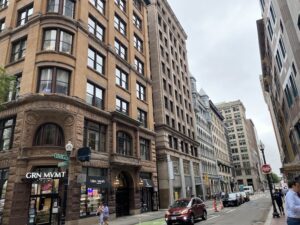Who is a member?
Our members are the local governments of Massachusetts and their elected and appointed leadership.

The city of Boston is looking for developers and owners of older properties downtown who might be willing to convert their office buildings into residential units.
As big cities nationwide attempt to revitalize downtown office districts hollowed out by the pandemic and the rise of remote work, the city of Boston is seeking to incentivize the conversion of underused office buildings into residential units.
In July, Mayor Michelle Wu announced a public-private partnership that will offer tax breaks to qualifying downtown developers and owners who convert office buildings into residential properties. The program seeks to inject more life into downtown, which hasn’t fully recovered post pandemic, and to provide badly needed residential units in the face of a regional, and statewide, housing shortage.
“We must take every possible action to create more housing and more affordability so that Boston’s growth meets the needs of current and future residents,” Wu said in a statement. “This program will help us take advantage of the opportunity we have to rethink downtown as a space where people from all over come together to collaborate, create, live, and play.”
Office buildings that convert to residential would go from the commercial tax rate (currently $24.68 per $1,000 of assessed value) to the residential rate (currently $10.74), and would qualify for up to a 75% discount on the residential tax rate for a 29-year period. The buildings must reserve 20% of the units as affordable and meet energy efficiency standards, and will be encouraged to preserve first-floor space for retail or other public uses. The city would receive a 2% payment if the property is later sold.
“This public private partnership opportunity is the right tool to unlock new housing and shape a new, mixed-use neighborhood downtown,” said Boston Planning Chief Arthur Jemison in a statement.
According to information provided by the city, about 10 developers and property owners have discussed potential conversion properties with officials. Some of the buildings aren’t in the immediate downtown, but are in neighboring areas including the North End and Fort Point Channel. The city hasn’t ruled out those buildings, though those applications would depend on neighborhood zoning, and could require variances, whereas downtown building conversions would be allowed as of right, based on zoning updates currently underway.
In particular, Boston is focusing on older office buildings — built roughly between 1910 and 1940 — of about 1o to 15 stories. Such buildings tend to be narrower, and can be converted more easily, allowing more rooms to have access to windows and natural light.
In the past couple of years, media headlines have been warning of a potential “urban doom loop” — a downward spiral in which downtowns lose workers and residents, forcing restaurants and retailers to shut down, which in turn reduces property tax revenues, forcing reductions in city services, which drives out more people and perpetuates the cycle. The city’s conversion plan would seek to address housing needs while guarding against a “doom loop.”
Estimates of Boston’s office vacancy rate vary, but they all suggest a sizable gap. A report released by the city last October indicated a post-pandemic commercial vacancy rate of around 20%. A report by the commercial real estate company CBRE estimated Boston’s office vacancy rate at 14.2% at the end of June 2023.
Other major U.S. cities — including Chicago, Pittsburgh, Washington, D.C., and Seattle — are exploring similar conversion efforts, though the details vary. Chicago is focusing on tax increment financing, Pittsburgh is offering subordinate loans for conversions, and Seattle launched a design competition to solicit conversion ideas.
Boston plans to start accepting applications in October, and will do so through June 2024. Approved projects must start construction by October 2025. The city said it may modify the program to reflect changing market conditions.